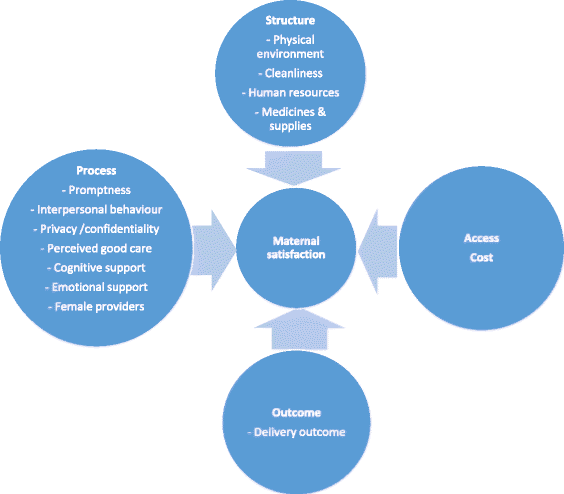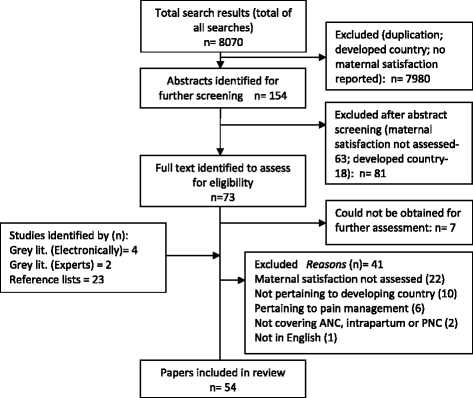Determinants of women's satisfaction with maternal health care: a review of literature from developing countries
- PMID: 25928085
- PMCID: PMC4417271
- DOI: 10.1186/s12884-015-0525-0
Determinants of women's satisfaction with maternal health care: a review of literature from developing countries
Abstract
Background: Developing countries account for 99 percent of maternal deaths annually. While increasing service availability and maintaining acceptable quality standards, it is important to assess maternal satisfaction with care in order to make it more responsive and culturally acceptable, ultimately leading to enhanced utilization and improved outcomes. At a time when global efforts to reduce maternal mortality have been stepped up, maternal satisfaction and its determinants also need to be addressed by developing country governments. This review seeks to identify determinants of women's satisfaction with maternity care in developing countries.
Methods: The review followed the methodology of systematic reviews. Public health and social science databases were searched. English articles covering antenatal, intrapartum or postpartum care, for either home or institutional deliveries, reporting maternal satisfaction from developing countries (World Bank list) were included, with no year limit. Out of 154 shortlisted abstracts, 54 were included and 100 excluded. Studies were extracted onto structured formats and analyzed using the narrative synthesis approach.
Results: Determinants of maternal satisfaction covered all dimensions of care across structure, process and outcome. Structural elements included good physical environment, cleanliness, and availability of adequate human resources, medicines and supplies. Process determinants included interpersonal behavior, privacy, promptness, cognitive care, perceived provider competency and emotional support. Outcome related determinants were health status of the mother and newborn. Access, cost, socio-economic status and reproductive history also influenced perceived maternal satisfaction. Process of care dominated the determinants of maternal satisfaction in developing countries. Interpersonal behavior was the most widely reported determinant, with the largest body of evidence generated around provider behavior in terms of courtesy and non-abuse. Other aspects of interpersonal behavior included therapeutic communication, staff confidence and competence and encouragement to laboring women.
Conclusions: Quality improvement efforts in developing countries could focus on strengthening the process of care. Special attention is needed to improve interpersonal behavior, as evidence from the review points to the importance women attach to being treated respectfully, irrespective of socio-cultural or economic context. Further research on maternal satisfaction is required on home deliveries and relative strength of various determinants in influencing maternal satisfaction.
Figures
References
-
- World Health Organization, UNICEF, UNFPA and The World Bank . Trends in Maternal Mortality: 1990-2010. WHO, UNICEF, UNFPA and The World Bank estimates. Geneva: World Health Organization; 2012.
-
- Thomason J, Edwards K. Using indicators to assess quality of hospital services in Papua New Guinea. Int J Health Plann Manage. 1991;6:309–11. doi: 10.1002/hpm.4740060406. - DOI
-
- Reerink IH, Sauerborn R. Quality of primary health care in developing countries: recent experiences and future directions. Int J Qual Health Care. 1996;8:131–9. - PubMed
Publication types
MeSH terms
Grants and funding
LinkOut - more resources
Full Text Sources
Other Literature Sources



